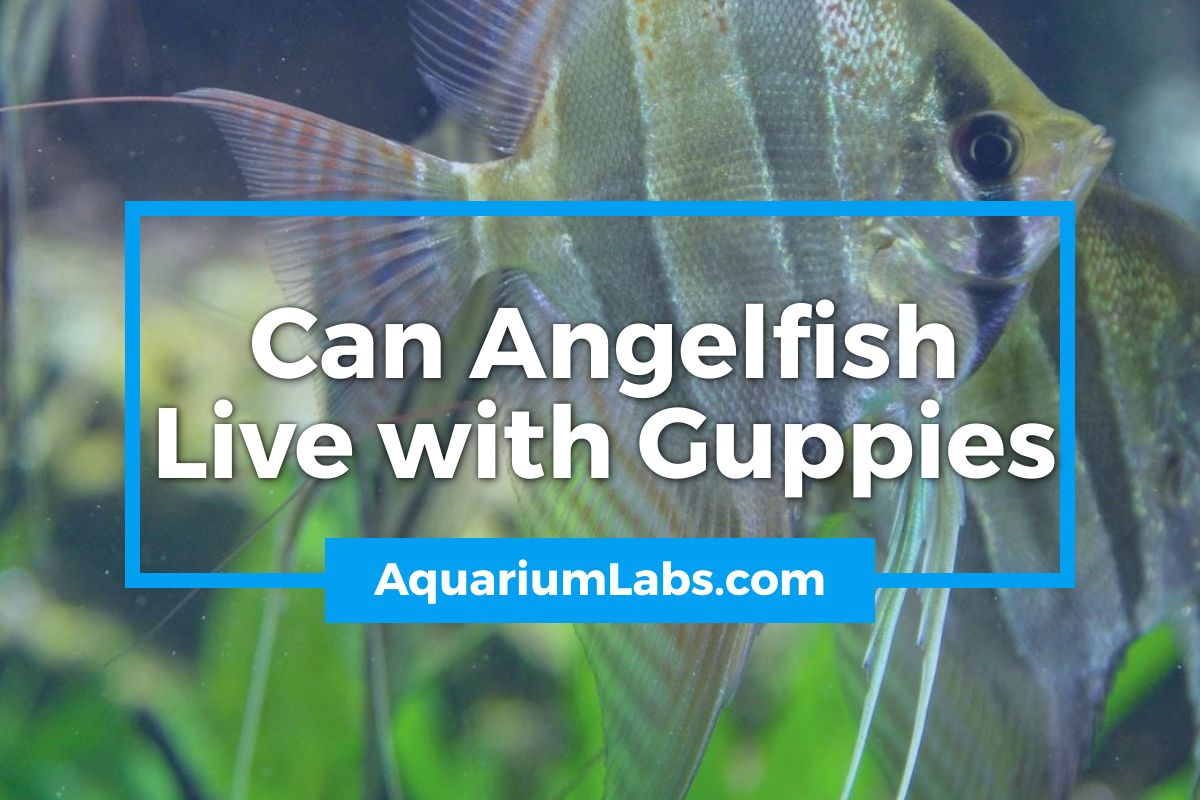Choosing the right fish species for a community tank is one of the most exciting aspects of caring for pets. But sometimes, the predatory or aggressive nature of one fish can make life very difficult for the others.
Playful guppies and stately angelfish sure sound like a winning combination, especially when small. The subdued, silvery tones of angelfish look so well alongside the loud colors and flag-like fins of guppies.
But can angelfish live with guppies in harmony together? Or might there be trouble in paradise in your near future?
Guppies and Angelfish in Their Natural Habitat
Both guppies and angelfish are found in South America, but you won’t find guppies and angelfish together in the same bodies of water naturally. Adult guppy fish are found exclusively in the northernmost parts of the continent in Venezuela, Barbados, and other parts of the region.
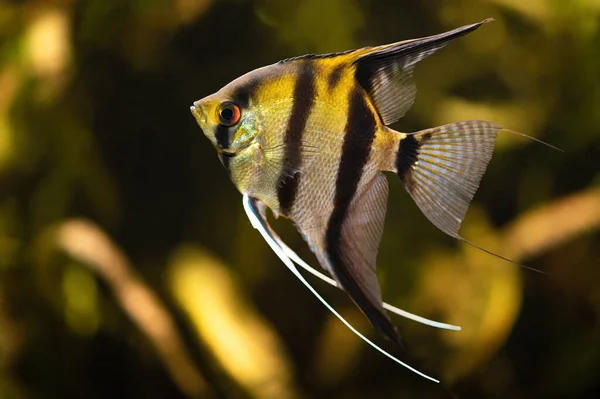
Guppy and Angelfish Water Chemistry
On the other hand, Angelfish are natives of the Amazon river basin, which flows mostly through Brazil and Peru. That said, both guppies and angelfish prefer warm, tropical conditions.
Guppy fish are found in significantly different water chemistries as well compared to what angelfish live in. Angelfish prefer soft and acidic water conditions (pH of 5.0-7.0), while guppy fish are fond of mineralization and a neutral to alkaline pH (7.0+). That said, guppies will still do well even in slightly acidic conditions, so the chemistry is not that much of a problem.
The main issue with keeping guppies and angelfish together is that one is a much smaller fish than its other tank mates…
Can Angelfish Live With Guppies in the Same Aquarium?
Keeping guppy fish in the same aquarium as angelfish is bound to lead to trouble sooner or later. The unfortunate truth is that angelfish are very opportunistic when it comes to prey. Most fish species are, in fact. As tiny as they are, even guppies will eat guppy fry and any other animal small enough to fit in their mouths.
But unlike guppies, angelfish are good-sized community tank residents. An adult angelfish will be anywhere from 5 to 8 inches long when fully grown. Meanwhile, the smaller guppy fish does not grow much beyond 2 inches, which is typical for adult female guppies. Males are even smaller and rarely get much larger than 1 to 1.5 inches. They are also very slim, making them nicely bite-sized for a predatory fish.
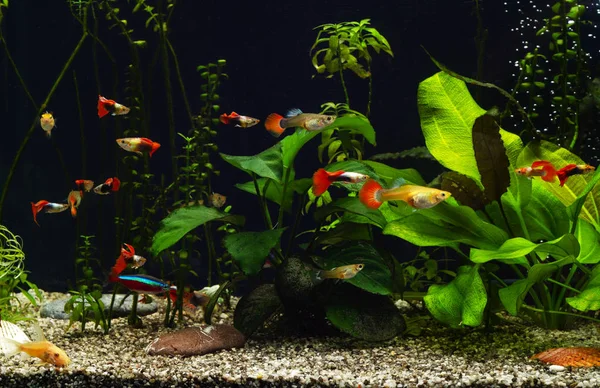
Aggressive vs Predatory Fish
Many aquarists (and websites and blogs) confuse aggressive fish with predatory fish. In truth, angelfish are peaceful fish, which is surprising since they are members of the cichlid family. Most of these fish have an aggressive nature, but angelfish are quite calm. They show little territorial behavior except when spawning (though you may get an aggressive angelfish once in a while).
It’s simply that they don’t mind an easy snack if it swims by. And slim that guppies swim by in a careless fashion may end up being eaten.
The angelfish is not being aggressive; it simply sees a meal. Angelfish can be kept with smaller fish than you would expect since they have very small mouths for their size. But guppies are so thin that they are more easily in danger of being eaten.
Many tetra fish species are also in danger of being consumed by a hungry angelfish. Neon tetras, zebra danios, and rasboras are all tank mates that an angelfish would try eating if very hungry and no leftover food is readily available.
Keeping Guppies With Aggressive Fish Species
Guppy fish really should only be kept with other fish species that are gentle and passive. Aggressive species should never be chosen as residents within the same tank. Even smaller fish can be too aggressive to be tank mates for guppies. Some feisty small fish include convict cichlids, many dwarf cichlids, paradise fish, and many killifish species.
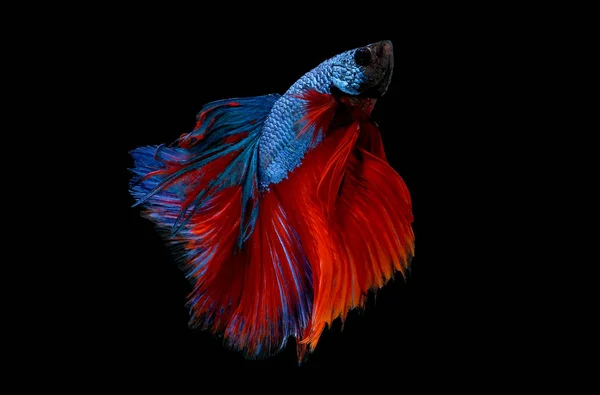
Betta fish can also sometimes be less than ideal tank mates. An adult betta fish can’t eat a guppy fish. But bettas will often act aggressively towards other fish species that have similar colors and long, waving fins. The betta is mistaking the other fish in the same tank as a rival male and will therefore chase it mercilessly. Guppy males are therefore a prime target for an especially aggressive male betta fish.
Are Guppy Fry In Danger Of Being Eaten?
Guppy fry are on the menu, even for the most peaceful community fish. Remember, predation is not aggression. Cherry barbs, danios, tetras, gouramis, angelfish, and other community aquarium residents will all eat any baby guppies that they come across. Even the adult guppies will try eating their babies. The young are just too small and helpless to survive most of the time.
If your fish tank is very well planted or it is a bigger tank with plenty of hiding places, then there is a chance that some of the guppy fry might survive. And even if most of your fish do eat baby guppies, some will usually make it to adulthood, surprising you as they eventually grow too large to be eaten.
How Can I Save My Guppy Fry?
Even young angelfish will find the babies of a female guppy to be a delightful snack. So how can we keep our baby guppy fish alive in a community tank? The best way to save them is to keep a pregnant female and the rest of your fish in separate aquariums.
Most pet stores carry breeding box setups, which can be quickly constructed and hung on the sides of your fish tank. A breeding box provides the female guppy with some privacy and protection. Once she has her babies, you can then move her back into the main fish tank.
The breeding chamber protects the young fry from the other fish in the tank while still offering water circulation and oxygenation. Once they grow large enough not to be easily eaten, you can move them into the main fish tank with their parents and new tank mates!
Compatible Tank Mates for Adult Guppies
Since guppies do not do well with any type of aggressive fish, it is better to choose other species that are not only non-predatory but also peaceful community tank residents. Peaceful species of fish that are usually around the same size include cherry barbs, tetras, dwarf gourami, danios, and other livebearing fish. Other livebearers include platies, swordtails, and mollies, all of whom prefer the same water conditions and are likely to have babies as well!
Bottom-dwelling fish that do not display territorial behavior and are great tank mates include corydoras catfish, the kuhli loach, and bristlenose plecos. You need to be very careful with dwarf cichlids because they can sometimes be temperamental. And if you have a male and female spawn, they will almost always display territorial behavior and harass every other fish in the tank.
German blue ram cichlids are a good choice of tank mates for guppies since they don’t grow too large and are very mild-mannered for a cichlid. Be careful with medium-sized species like keyhole cichlids. While they are also peaceful fish, they grow just a little too large and could easily eat a small guppy fish.
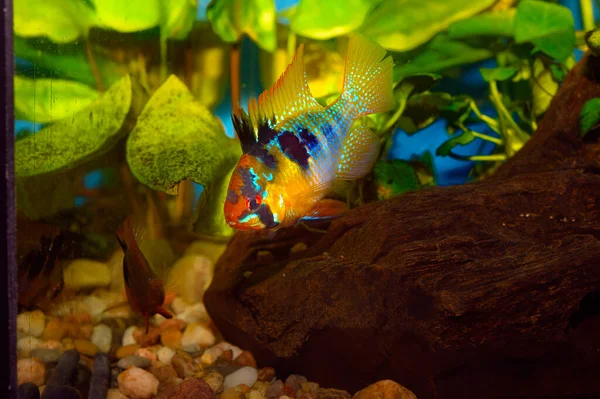
Young angelfish can live with adult guppies since they have fairly small mouths. But they will still try and eat young guppies if they think guppies will fit inside its mouth. It’s better to maintain two separate aquariums if you simply must have guppies and angelfish together.
Suitable Tank Mates for Adult Angelfish
Angelfish, on the other hand, need very different neighbors. In general, larger fishes make the best tank mates for adult angelfish. You are better off with a very large tank if you want to keep several angelfish and many larger fish in the same tank. You will want at least 55 gallons of space for a community tank full of appropriately sized fish.
What Fish Can Go With Angel Fish?
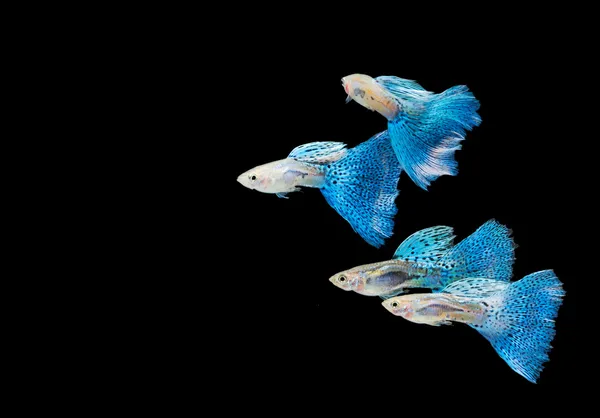
A few good tank mates for larger angelfish include blue gouramis, severums, keyhole cichlids, plecostomus, cory cats, giant danios, and sailfin mollies. You can also keep several angelfish together in a large aquarium because they are social fish and enjoy being kept in groups of around six individuals.
If you want to try other colorful cichlids, then you can also keep german blue rams with angelfish. Blue rams are just as mild-mannered and unwilling to fight as any angelfish. And their vibrant blue, gold, and purple tones really add extra interest to the black and silver hues that angelfish have!
In Conclusion
Overall, two separate aquariums are best, keeping both species separated from each other. Guppies are really beautiful and truly ideal community fish. But they are also just too perfect a snack for fully grown adult angelfish.
Related:
- Can Angelfish Live Peacefully With Goldfish?
- What Are Reef Safe Angelfish?
- What Water Temperatures Do Guppies Need?
- Can Angelfish Live Alone?
- Can Angelfish Live with Glofish?
- How Can You Tell If a Guppy Is Male or Female?

